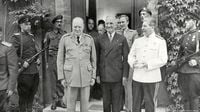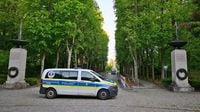On May 8, 2025, the city of Delmenhorst released a poignant video message from Mayor Petra Gerlach, commemorating the 80th anniversary of the end of World War II. In her address, Gerlach reflects on the suffering endured during the war, the responsibilities of the present, and the enduring significance of peace—both in the past and in contemporary times. Her speech serves as a reminder of the historical obligation to uphold peace and engage actively in societal efforts to maintain it.
The date marks a crucial moment in history, as it commemorates the unconditional surrender of the German Wehrmacht on May 8, 1945, which effectively ended the war in Europe. This surrender followed a devastating conflict that began on September 1, 1939, with the German invasion of Poland. The war resulted in approximately 60 million deaths worldwide, including six million Jews who were murdered in the Holocaust. Adolf Hitler's suicide in his Berlin bunker just days before the surrender underscored the collapse of the Nazi regime.
As part of the 80th anniversary observances, various events were held across Europe, including a dance flash mob in the district of Pinneberg. This performance, organized by students from Bismarckschule Elmshorn and Beruflichen Schulen Elmshorn and Pinneberg, took place at approximately 11:30 AM on Drosteiplatz. The dance commemorated persecuted swing dancers during the Nazi era, aiming to foster a shared culture of remembrance across Europe. Similar events were organized in cities like Bremen, Hamburg, Aachen, Prague, and Gdansk, emphasizing the collective memory of liberation from National Socialism.
In Germany, the 8th of May is celebrated as the "Day of Liberation" from Nazi rule, although it remains a complex and sometimes contentious observance. Unlike Berlin, where the day was designated a public holiday for this occasion, many parts of Germany grapple with the dual feelings of liberation and the profound sense of loss stemming from the war's devastation.
Foreign Minister Johann Wadephul articulated the need for Germany to defend peace and freedom in Europe resolutely, framing this commitment as a historical responsibility arising from the atrocities committed during the war. He stated, "Our freedom is owed to the enormous sacrifices of the Allies. For that, we are forever grateful." This sentiment resonates with the broader reflections of the day, as leaders and citizens alike recognize the lessons of the past in the context of current geopolitical tensions.
At noon, the Bundestag held a solemn memorial service attended by key government officials, including newly appointed Chancellor Friedrich Merz. Bundespräsident Frank-Walter Steinmeier delivered the commemorative address, focusing on the lessons learned from the capitulation of Nazi Germany, particularly in light of the ongoing Russian aggression against Ukraine and the implications of Donald Trump's second presidency. Steinmeier's remarks are expected to address the distortion of history by figures such as Russian President Vladimir Putin, who has accused Ukraine of fascism, while also acknowledging the contributions of Ukrainian fighters in the liberation of Nazi concentration camps.
As Europe reflects on the past, the implications of the war's end continue to shape contemporary policies and alliances. In 1947, President Harry Truman articulated the Truman Doctrine, emphasizing the United States' commitment to supporting free peoples resisting subjugation, a principle that has guided U.S. foreign policy since. However, recent developments, including Trump's questioning of NATO's protective role, have raised concerns about the future of transatlantic alliances.
Historian Norbert Frei from Jena University pointed out that the current political landscape is witnessing a significant transformation, comparable to the seismic shifts of 1945 and 1989. He noted that the transatlantic order, largely established by the U.S. post-World War II, is unraveling before our eyes. His colleague, historian Manfred Görtemaker, echoed this sentiment, warning that Trump's presidency has exposed the neglect of European defense responsibilities and the fragility of alliances.
In light of these challenges, Friedrich Merz has called for Europe to pursue greater independence in security matters, stating that the continent must prepare to stand on its own if necessary. This perspective reflects a growing sentiment among some German leaders that Europe needs to bolster its defense capabilities without relying solely on American support.
However, experts caution against the notion of complete independence from the U.S., emphasizing that nuclear deterrence remains a critical aspect of European security, which relies on American military support. The question of whether Europe can effectively navigate its security landscape independently or must reinforce its ties with Washington remains a pressing issue.
As the 80th anniversary of the war's end unfolds, the legacy of World War II continues to resonate in discussions about peace, security, and the responsibilities of nations. The peace trek, set to cover 5,000 kilometers from Berlin to Jerusalem, aims to symbolize reconciliation and dialogue among diverse communities, culminating in the donation of a peace bell made from military scrap metal to a school where Jewish, Muslim, and Christian children learn together. This initiative reflects a commitment to fostering understanding and cooperation in a time marked by division and conflict.
Ultimately, the observance of this significant anniversary serves as a reminder of the past's weight on the present and the urgent need for continued vigilance in preserving peace and freedom in Europe and beyond. As the world grapples with the lessons of history, the importance of collective remembrance and proactive engagement in building a peaceful future cannot be overstated.






